英文版中国成语故事
- 格式:doc
- 大小:26.00 KB
- 文档页数:3
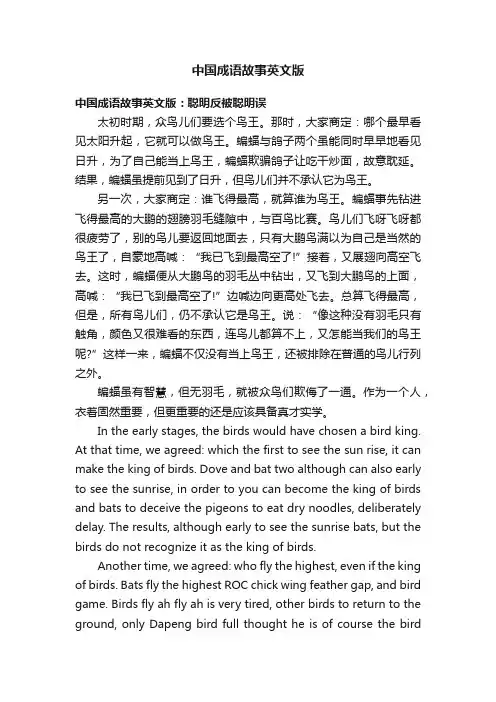
中国成语故事英文版中国成语故事英文版:聪明反被聪明误太初时期,众鸟儿们要选个鸟王。
那时,大家商定:哪个最早看见太阳升起,它就可以做鸟王。
蝙蝠与鸽子两个虽能同时早早地看见日升,为了自己能当上鸟王,蝙蝠欺骗鸽子让吃干炒面,故意耽延。
结果,蝙蝠虽提前见到了日升,但鸟儿们并不承认它为鸟王。
另一次,大家商定:谁飞得最高,就算谁为鸟王。
蝙蝠事先钻进飞得最高的大鹏的翅膀羽毛缝隙中,与百鸟比赛。
鸟儿们飞呀飞呀都很疲劳了,别的鸟儿要返回地面去,只有大鹏鸟满以为自己是当然的鸟王了,自豪地高喊:“我已飞到最高空了!”接着,又展翅向高空飞去。
这时,蝙蝠便从大鹏鸟的羽毛丛中钻出,又飞到大鹏鸟的上面,高喊:“我已飞到最高空了!”边喊边向更高处飞去。
总算飞得最高,但是,所有鸟儿们,仍不承认它是鸟王。
说:“像这种没有羽毛只有触角,颜色又很难看的东西,连鸟儿都算不上,又怎能当我们的鸟王呢?”这样一来,蝙蝠不仅没有当上鸟王,还被排除在普通的鸟儿行列之外。
蝙蝠虽有智慧,但无羽毛,就被众鸟们欺侮了一通。
作为一个人,衣着固然重要,但更重要的还是应该具备真才实学。
In the early stages, the birds would have chosen a bird king. At that time, we agreed: which the first to see the sun rise, it can make the king of birds. Dove and bat two although can also early to see the sunrise, in order to you can become the king of birds and bats to deceive the pigeons to eat dry noodles, deliberately delay. The results, although early to see the sunrise bats, but the birds do not recognize it as the king of birds.Another time, we agreed: who fly the highest, even if the king of birds. Bats fly the highest ROC chick wing feather gap, and bird game. Birds fly ah fly ah is very tired, other birds to return to the ground, only Dapeng bird full thought he is of course the birdthe king, proudly shouted: "I have to fly to the highest air!" then, and wings to go upstairs. Then bats from Dapeng bird feathers Bush drilled, and fly to the ROC, shouting: "I have to fly to the highest empty!" shouted to a high flying. At last, it was the highest, but, all the birds, it was not the king of birds. Said: "like this not only tentacles of feathers, color and very ugly things, even the birds are not, how can we King bird when it?" in this way. The bat did not become the king of the birds, also be excluded outside the ranks of ordinary birds.Although bats have wisdom, but no feathers, all the birds were a bully. As a person, dress is important, but more important still should have true skill and genuine knowledge.中国成语故事英文版:半途而废东汉时,河南郡有一位贤慧的女子,人们都不知她叫什么名字,只知道是乐羊子的妻子。
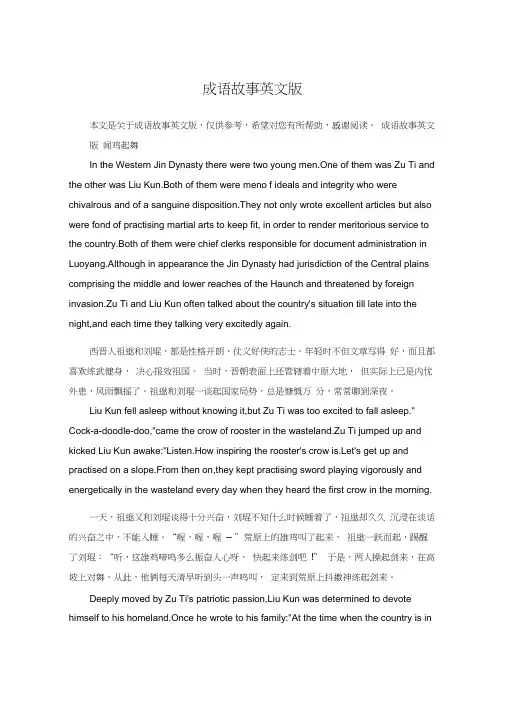
成语故事英文版本文是关于成语故事英文版,仅供参考,希望对您有所帮助,感谢阅读。
成语故事英文版闻鸡起舞In the Western Jin Dynasty there were two young men.One of them was Zu Ti and the other was Liu Kun.Both of them were meno f ideals and integrity who were chivalrous and of a sanguine disposition.They not only wrote excellent articles but also were fond of practising martial arts to keep fit, in order to render meritorious service to the country.Both of them were chief clerks responsible for document administration in Luoyang.Although in appearance the Jin Dynasty had jurisdiction of the Central plains comprising the middle and lower reaches of the Haunch and threatened by foreign invasion.Zu Ti and Liu Kun often talked about the country's situation till late into the night,and each time they talking very excitedly again.西晋人祖逖和刘琨,都是性格开朗、仗义好侠的志士。
年轻时不但文章写得好,而且都喜欢练武健身,决心报效祖国。
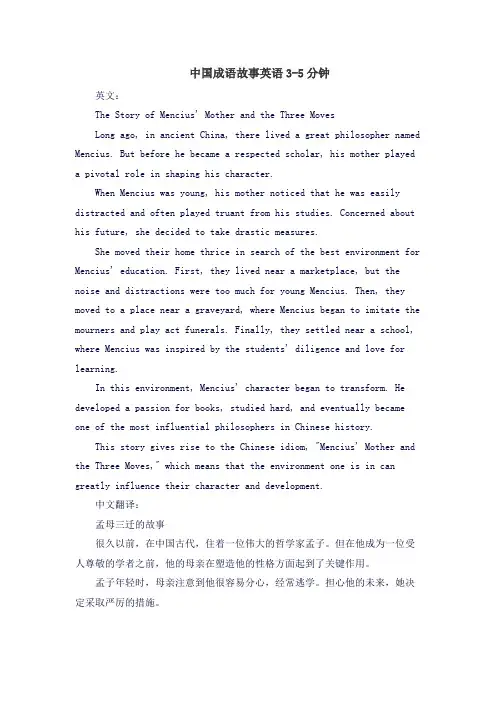
中国成语故事英语3-5分钟英文:The Story of Mencius' Mother and the Three MovesLong ago, in ancient China, there lived a great philosopher named Mencius. But before he became a respected scholar, his mother played a pivotal role in shaping his character.When Mencius was young, his mother noticed that he was easily distracted and often played truant from his studies. Concerned about his future, she decided to take drastic measures.She moved their home thrice in search of the best environment for Mencius' education. First, they lived near a marketplace, but the noise and distractions were too much for young Mencius. Then, they moved to a place near a graveyard, where Mencius began to imitate the mourners and play act funerals. Finally, they settled near a school, where Mencius was inspired by the students' diligence and love for learning.In this environment, Mencius' character began to transform. He developed a passion for books, studied hard, and eventually became one of the most influential philosophers in Chinese history.This story gives rise to the Chinese idiom, "Mencius' Mother and the Three Moves," which means that the environment one is in can greatly influence their character and development.中文翻译:孟母三迁的故事很久以前,在中国古代,住着一位伟大的哲学家孟子。
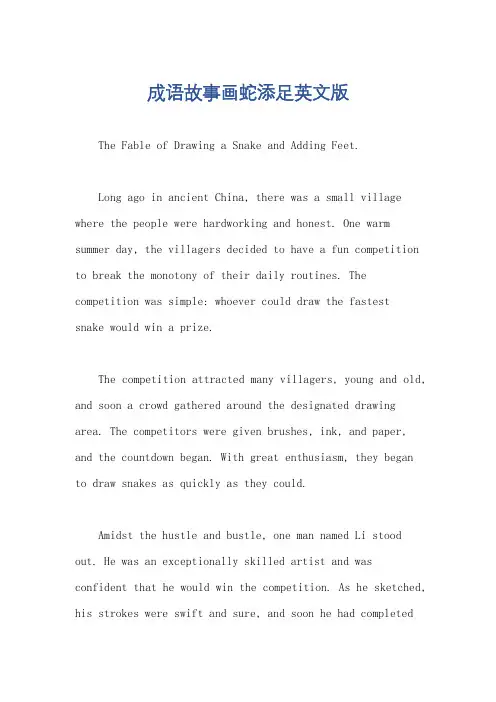
成语故事画蛇添足英文版The Fable of Drawing a Snake and Adding Feet.Long ago in ancient China, there was a small village where the people were hardworking and honest. One warm summer day, the villagers decided to have a fun competition to break the monotony of their daily routines. The competition was simple: whoever could draw the fastestsnake would win a prize.The competition attracted many villagers, young and old, and soon a crowd gathered around the designated drawing area. The competitors were given brushes, ink, and paper, and the countdown began. With great enthusiasm, they beganto draw snakes as quickly as they could.Amidst the hustle and bustle, one man named Li stood out. He was an exceptionally skilled artist and wasconfident that he would win the competition. As he sketched, his strokes were swift and sure, and soon he had completedthe outline of a snake. It was a beautiful snake, coiled and ready to strike.Satisfied with his work, Li looked around and saw that no one else had finished yet. Feeling a sense of pride, he decided to embellish his snake by adding feet. After all, snakes were known to slither on their bellies, but what if he drew a snake that walked on its feet? It would be unique and even more impressive, he thought.As Li was busy adding feet to his snake, another contestant named Wang finished his drawing. Wang's snake was not as elegant as Li's, but it was a snake nonetheless. When the judge came to inspect the drawings, Wang's simple snake was declared the winner.Confused and disappointed, Li protested, pointing to his own drawing and saying, "My snake is more unique. It even has feet!" The judge shook his head and explained, "While your snake may be unique, it is no longer a snake. Snakes do not have feet. By adding feet, you have changed its essence. In trying to make it better, you have actuallyruined it."Li realized his mistake. He had been so focused on making his snake stand out that he had overlooked the basic truth about snakes. His pride and overconfidence had led him to add unnecessary details, which ultimately cost him the competition.This fable teaches us an important lesson about balance and wisdom. Sometimes, in our eagerness to excel or to be unique, we may add unnecessary elements or complicate things unnecessarily. This can lead to loss of focus and, ultimately, failure. It is important to remember that simplicity often wins the day, and true wisdom lies in understanding the essence of things.In life, we often find ourselves in similar situations. We strive to improve or innovate, but sometimes we overdo it, adding complexity where it is not needed. This can cloud our vision and lead us astray. The fable of Drawing a Snake and Adding Feet reminds us to stay focused on the basics, to appreciate simplicity, and to avoid addingunnecessary embellishments that may only serve to hinder our progress.Moreover, the story highlights the importance of understanding the true nature of things. Just as snakes do not have feet, so do many other things in life have inherent limitations and characteristics that should not be tampered with. Understanding and respecting these limitations can help us navigate life's challenges more effectively.In conclusion, the fable of Drawing a Snake and Adding Feet is a timeless tale that teaches us valuable lessons about simplicity, focus, and wisdom. By embracing these values, we can avoid making costly mistakes and achieve greater success in our personal and professional lives.。
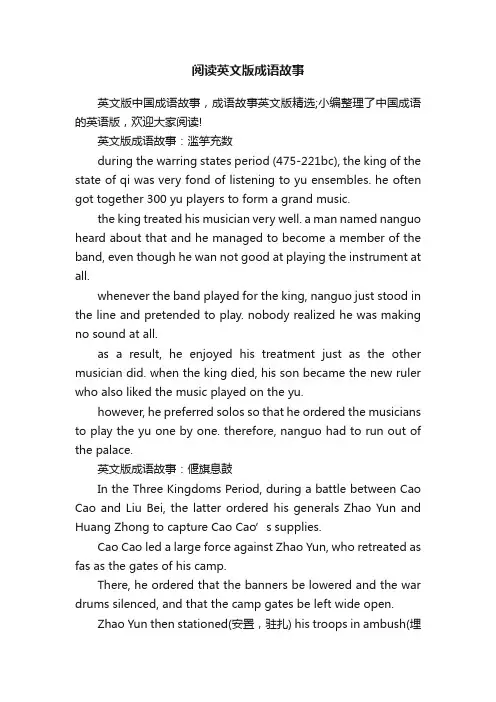
阅读英文版成语故事英文版中国成语故事,成语故事英文版精选;小编整理了中国成语的英语版,欢迎大家阅读!英文版成语故事:滥竽充数during the warring states period (475-221bc), the king of the state of qi was very fond of listening to yu ensembles. he often got together 300 yu players to form a grand music.the king treated his musician very well. a man named nanguo heard about that and he managed to become a member of the band, even though he wan not good at playing the instrument at all.whenever the band played for the king, nanguo just stood in the line and pretended to play. nobody realized he was making no sound at all.as a result, he enjoyed his treatment just as the other musician did. when the king died, his son became the new ruler who also liked the music played on the yu.however, he preferred solos so that he ordered the musicians to play the yu one by one. therefore, nanguo had to run out of the palace.英文版成语故事:偃旗息鼓In the Three Kingdoms Period, during a battle between Cao Cao and Liu Bei, the latter ordered his generals Zhao Yun and Huang Zhong to capture Cao Cao’s supplies.Cao Cao led a large force against Zhao Yun, who retreated as fas as the gates of his camp.There, he ordered that the banners be lowered and the war drums silenced, and that the camp gates be left wide open.Zhao Yun then stationed(安置,驻扎) his troops in ambush(埋伏) nearly. When Cao Cao arrived and saw the situation, he immediately suspected a trap and withdrew his forces.This idiom is nowadays used to indicate metaphorically(隐喻地) halting an attack or ceasing all activities.英文版成语故事:破镜重圆in the northern and southern dynasties when the state of chen (a.d. 557-589) was facing its demise(死亡,终止) , xu deyan, husband of the princess, broke a bronze mirror into halves.each of them kept a half as tokens(代币,符号) in case they were separated. soon afterwards, they did lose touch with each other, but the two halves of the mirror enabled them to be reunited.this idiom is used to refer to the reunion of a couple after they lose touch or break up.英文版成语故事:枕戈待旦In the Western Jin Dynasty there were two young men.One of them was Zu Ti and the other was Liu Kun.Both of them were men of ideals and integrity who were chivalrous and of a sanguine disposition.They not only wrote excellent articles but also were fond of practising martial arts to keep fit, in order to render meritorious service to the country.Both of them were chief clerks responsible for document administration in Luoyang.Although in appearance the Jin Dynasty had jurisdiction of the Central Plains comprising the middle and lower reaches of the Haunch and threatened by foreign invasion.Zu Ti and Liu Kun often talked about the country's situation till late into the night,and each time they talking very excitedly again.Liu Kun fell asleep without knowing it,but Zu Ti was too excited to fall asleep." Cock-a-doodle-doo,"came the crow of rooster in the wasteland.Zu Ti jumped up and kicked Liu Kunawake:"Listen.How inspiring the rooster's crow is.Let's get up and practised on a slope.From then on,they kept practising sword playing vigorously and energetically in the wasteland every day when they heard the first crow in the morning.Deeply moved by Zu Ti's patriotic passion,Liu Kun was determined to devote himself to his homeland.Once he wrote to his family:"At the time when the country is in dire peril,I am resolved to dedicate myselt to the service of my country.I often fear that I might lag behind Zu Ti in rendering service to the country,and,in fact,I am behind him..."The words" sleep with my head pillowed on a spear,waiting for the day to break"vividly described Liu Kun's determination to dedicate himself to the service of the country and to fight the enemy at any ter,this set phrase is used to mean maintaining sharp vigilance and being ready to fight at any time."英文版成语故事:破釜沉舟during the late years of the qi dynasty(221-206bc), xiang yu led a rebellion. after crossing the zhang river, xiang yu ordered his men to sink all their boats and break their cooking pots.he issued each soldier three days' rations(给养) and warned them that there was no way to retreat; the only thing they could do to survive was to advance and fight.after mine fierce battles, the qin army was finally defeated.this idiom is used to indicate one's firm determination to achieve one's goal at any cost.英文版成语故事:骑虎难下Yan Jian was the regent(摄政王) of the last king of Northern Zhou(557-581).His wife advised him: "Northern Zhou is dying. Now it is as if you are riding on the back of a tiger. It will be dangerous todismount(下马,下车) . You can do nothing but continue."Yan Jian thought this quite reasonable. Later, he founded the Sui Dynasty, and united China once more.This idom is used as a metaphor meaning that one is in a difficult situation and cannot help but ontinue to pursue one's sourse.。
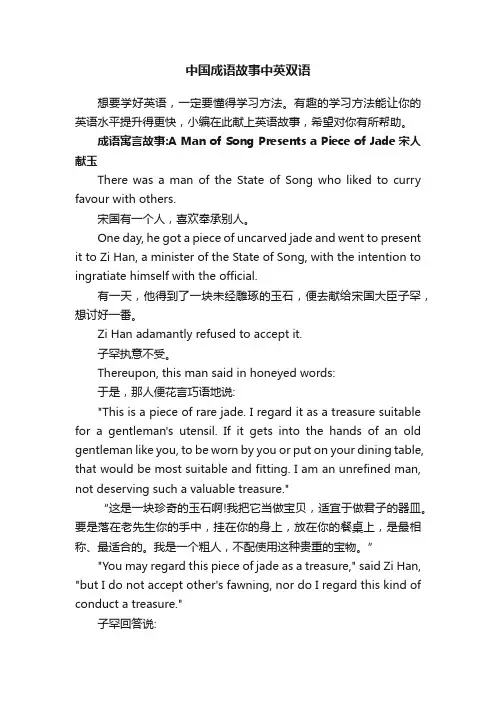
中国成语故事中英双语想要学好英语,一定要懂得学习方法。
有趣的学习方法能让你的英语水平提升得更快,小编在此献上英语故事,希望对你有所帮助。
成语寓言故事:A Man of Song Presents a Piece of Jade宋人献玉There was a man of the State of Song who liked to curry favour with others.宋国有一个人,喜欢奉承别人。
One day, he got a piece of uncarved jade and went to present it to Zi Han, a minister of the State of Song, with the intention to ingratiate himself with the official.有一天,他得到了一块未经雕琢的玉石,便去献给宋国大臣子罕,想讨好一番。
Zi Han adamantly refused to accept it.子罕执意不受。
Thereupon, this man said in honeyed words:于是,那人便花言巧语地说:"This is a piece of rare jade. I regard it as a treasure suitable for a gentleman's utensil. If it gets into the hands of an old gentleman like you, to be worn by you or put on your dining table, that would be most suitable and fitting. I am an unrefined man, not deserving such a valuable treasure."“这是一块珍奇的玉石啊!我把它当做宝贝,适宜于做君子的器皿。
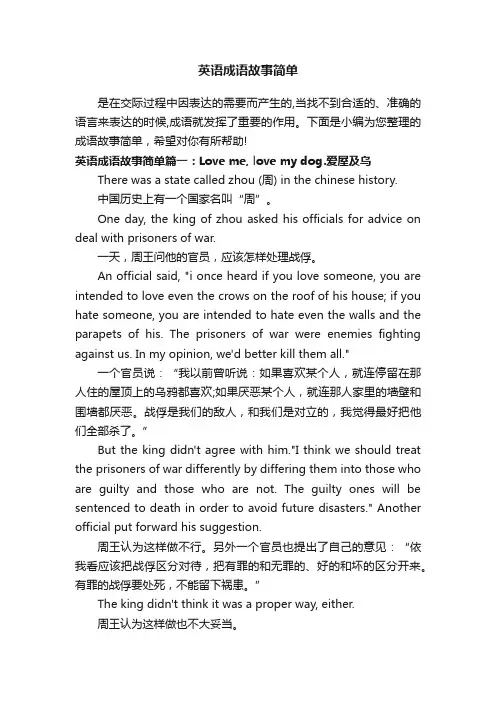
英语成语故事简单是在交际过程中因表达的需要而产生的,当找不到合适的、准确的语言来表达的时候,成语就发挥了重要的作用。
下面是小编为您整理的成语故事简单,希望对你有所帮助!英语成语故事简单篇一:Love me, love my dog.爱屋及乌There was a state called zhou (周) in the chinese history.中国历史上有一个国家名叫“周”。
One day, the king of zhou asked his officials for advice on deal with prisoners of war.一天,周王问他的官员,应该怎样处理战俘。
An official said, "i once heard if you love someone, you are intended to love even the crows on the roof of his house; if you hate someone, you are intended to hate even the walls and the parapets of his. The prisoners of war were enemies fighting against us. In my opinion, we'd better kill them all."一个官员说:“我以前曾听说:如果喜欢某个人,就连停留在那人住的屋顶上的乌鸦都喜欢;如果厌恶某个人,就连那人家里的墙壁和围墙都厌恶。
战俘是我们的敌人,和我们是对立的,我觉得最好把他们全部杀了。
”But the king didn't agree with him."I think we should treat the prisoners of war differently by differing them into those who are guilty and those who are not. The guilty ones will be sentenced to death in order to avoid future disasters." Another official put forward his suggestion.周王认为这样做不行。
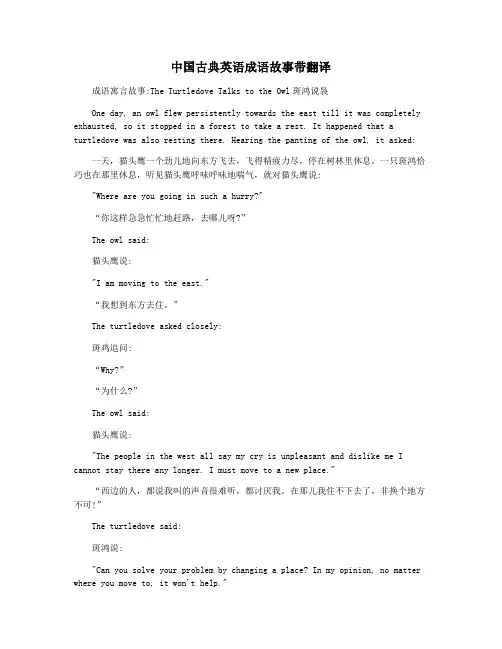
中国古典英语成语故事带翻译成语寓言故事:The Turtledove Talks to the Owl斑鸿说袅One day, an owl flew persistently towards the east till it was completely exhausted, so it stopped in a forest to take a rest. It happened that a turtledove was also resting there. Hearing the panting of the owl, it asked:一天,猫头鹰一个劲儿地向东方飞去,飞得精疲力尽,停在树林里休息。
一只斑鸿恰巧也在那里休息,听见猫头鹰呼味呼味地喘气,就对猫头鹰说:"Where are you going in such a hurry?"“你这样急急忙忙地赶路,去哪儿呀?”The owl said:猫头鹰说:"I am moving to the east."“我想到东方去住。
”The turtledove asked closely:斑鸡追问:“Why?”“为什么?”The owl said:猫头鹰说:"The people in the west all say my cry is unpleasant and dislike me I cannot stay there any longer. I must move to a new place."“西边的人,都说我叫的声音很难听,都讨厌我。
在那儿我住不下去了,非换个地方不可!”The turtledove said:斑鸿说:"Can you solve your problem by changing a place? In my opinion, no matter where you move to, it won't help."“难道换个地方就可以解决问题吗?我看,不管你搬到哪里去,都没有用!”The owl felt rather angry at the words of the turtledove, but it still asked in surprise:猫头鹰觉得斑坞的话太气人,便惊奇地问:"Can you forecast the future?"“你能未卜先知?”The turtledove said:斑鸡说:"This is very simple. If you don't change your cry, the people in the east will dislike you all the same."“这很简单,如果你不改变你的叫声,那么东边的人也一样会讨厌你的!”成语寓言故事:Chasing a Woman Only to Lose His Wife追女失妻Zhao Jianzi, the famous general of the State of Jin, prepared to attack the State of Qi. He ordered:晋国名将赵简子准备出兵进攻齐国。
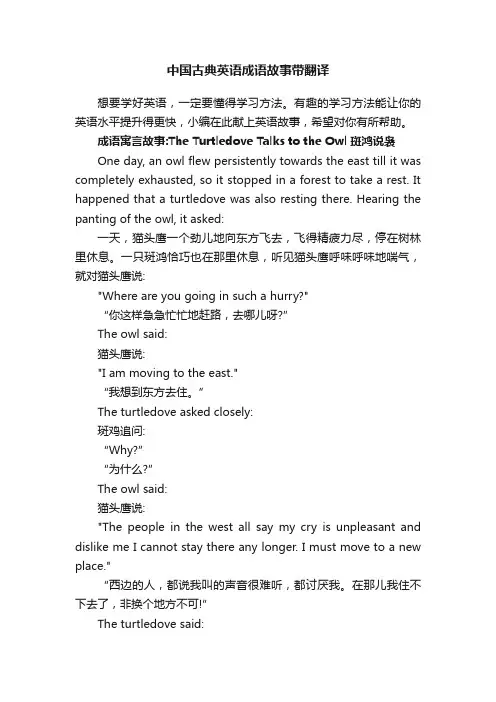
中国古典英语成语故事带翻译想要学好英语,一定要懂得学习方法。
有趣的学习方法能让你的英语水平提升得更快,小编在此献上英语故事,希望对你有所帮助。
成语寓言故事:The Turtledove Talks to the Owl斑鸿说袅One day, an owl flew persistently towards the east till it was completely exhausted, so it stopped in a forest to take a rest. It happened that a turtledove was also resting there. Hearing the panting of the owl, it asked:一天,猫头鹰一个劲儿地向东方飞去,飞得精疲力尽,停在树林里休息。
一只斑鸿恰巧也在那里休息,听见猫头鹰呼味呼味地喘气,就对猫头鹰说:"Where are you going in such a hurry?"“你这样急急忙忙地赶路,去哪儿呀?”The owl said:猫头鹰说:"I am moving to the east."“我想到东方去住。
”The turtledove asked closely:斑鸡追问:“Why?”“为什么?”The owl said:猫头鹰说:"The people in the west all say my cry is unpleasant and dislike me I cannot stay there any longer. I must move to a new place."“西边的人,都说我叫的声音很难听,都讨厌我。
在那儿我住不下去了,非换个地方不可!”The turtledove said:"Can you solve your problem by changing a place? In my opinion, no matter where you move to, it won't help."“难道换个地方就可以解决问题吗?我看,不管你搬到哪里去,都没有用!”The owl felt rather angry at the words of the turtledove, but it still asked in surprise:猫头鹰觉得斑坞的话太气人,便惊奇地问:"Can you forecast the future?"“你能未卜先知?”The turtledove said:斑鸡说:"This is very simple. If you don't change your cry, the people in the east will dislike you all the same."“这很简单,如果你不改变你的叫声,那么东边的人也一样会讨厌你的!”成语寓言故事:Chasing a Woman Only to Lose His Wife追女失妻Zhao Jianzi, the famous general of the State of Jin, prepared to attack the State of Qi. He ordered:晋国名将赵简子准备出兵进攻齐国。
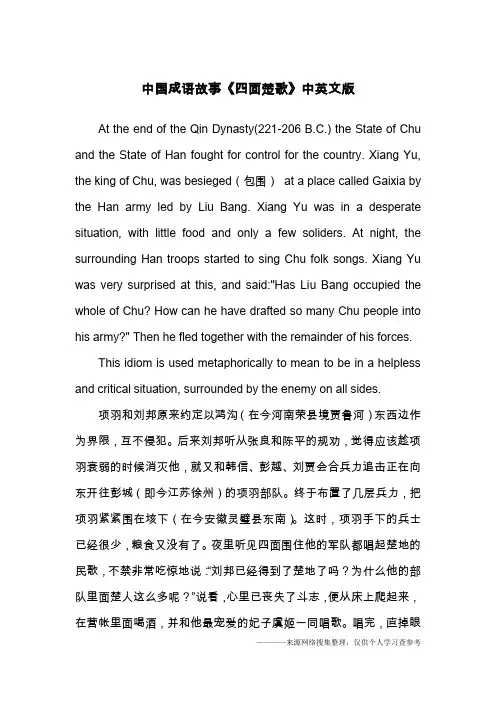
中国成语故事《四面楚歌》中英文版At the end of the Qin Dynasty(221-206 B.C.) the State of Chu and the State of Han fought for control for the country. Xiang Yu, the king of Chu, was besieged(包围)at a place called Gaixia by the Han army led by Liu Bang. Xiang Yu was in a desperate situation, with little food and only a few soliders. At night, the surrounding Han troops started to sing Chu folk songs. Xiang Yu was very surprised at this, and said:"Has Liu Bang occupied the whole of Chu? How can he have drafted so many Chu people into his army?" Then he fled together with the remainder of his forces.This idiom is used metaphorically to mean to be in a helpless and critical situation, surrounded by the enemy on all sides.项羽和刘邦原来约定以鸿沟(在今河南荣县境贾鲁河)东西边作为界限,互不侵犯。
后来刘邦听从张良和陈平的规劝,觉得应该趁项羽衰弱的时候消灭他,就又和韩信、彭越、刘贾会合兵力追击正在向东开往彭城(即今江苏徐州)的项羽部队。
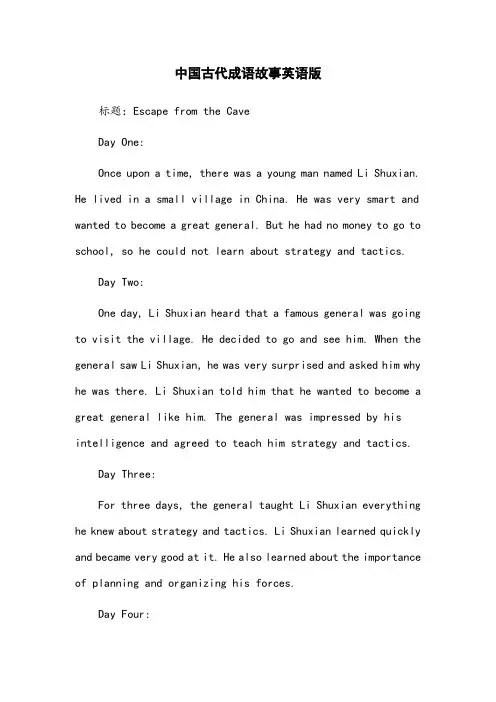
中国古代成语故事英语版标题:Escape from the CaveDay One:Once upon a time, there was a young man named Li Shuxian. He lived in a small village in China. He was very smart and wanted to become a great general. But he had no money to go to school, so he could not learn about strategy and tactics.Day Two:One day, Li Shuxian heard that a famous general was going to visit the village. He decided to go and see him. When the general saw Li Shuxian, he was very surprised and asked him why he was there. Li Shuxian told him that he wanted to become a great general like him. The general was impressed by his intelligence and agreed to teach him strategy and tactics. Day Three:For three days, the general taught Li Shuxian everything he knew about strategy and tactics. Li Shuxian learned quickly and became very good at it. He also learned about the importance of planning and organizing his forces.Day Four:Finally, the day came when Li Shuxian had to test his new knowledge. He led his forces against an enemy army and won the battle easily. He was now a great general and could finally achieve his dream of becoming a great general.Day Five:Li Shuxian returned to the small village and became famous. He taught his knowledge to other young men who wanted to become great generals. They all learned from him and became successful generals too.Title: Li Shuxian"s Escape from the CaveDay One:Once upon a time, there was a young man named Li Shuxian. He lived in a small village in China. He was very smart and wanted to become a great general. But he had no money to go to school, so he could not learn about strategy and tactics.Day Two:One day, Li Shuxian heard that a famous general was going to visit the village. He decided to go and see him. When the general saw Li Shuxian, he was very surprised and asked him why he was there. Li Shuxian told him that he wanted to become a great general like him. The general was impressed by hisintelligence and agreed to teach him strategy and tactics. Day Three:For three days, the general taught Li Shuxian everything he knew about strategy and tactics. Li Shuxian learned quickly and became very good at it. He also learned about the importance of planning and organizing his forces.Day Four:Finally, the day came when Li Shuxian had to test his new knowledge. He led his forces against an enemy army and won the battle easily. He was now a great general and could finally achieve his dream of becoming a great general.Day Five:Li Shuxian returned to the small village and became famous. He taught his knowledge to other young men who wanted to become great generals. They all learned from him and became successful generals too.。
英语成语小故事大全是古代语和事的高度凝练和浓缩,往往文言色彩浓厚,保留着许多古汉语词汇的痕迹,现代人可以借以了解当时的社会、文化、语言等面貌。
下面是小编为您整理的成语小故事大全,希望对你有所帮助! 英语成语小故事篇一:highly talented才高八斗tsau pi and tsau jr were sons of tsau tsau. both were very gifted writers, and tsau jr was especially quick-witted.曹丕与曹植都是曹操的儿子,二者均有才华,特别是曹植更具文采。
after tsau tsau's death, tsau pi took over the throne of the kingdom of wei. jealous of tsau jr's literary ability, and afraid that he might cause problems, tsau pi was always looking for a way to kill his brother.在曹操死后,曹丕继任大统,但他嫉妒曹植的才华,同时也惧怕曹植回谋反,所以一直在伺机杀害曹植。
one day, tsau pi called tsau jr into see him.he ordered his brother to make up a poem within the time it took to walk seven steps, adding that if he could not, his life would be in danger.有一天,曹丕要求接见曹植,他要求曹植在他七步之内作诗一首,如果做不到,就会有生命危险。
greatly saddened, tsau jr began to walk and to think. before he had taken the seven steps, he had already finished his poem, the meaning of which was: "brothers are of the same family, so why should the oppress each other?"悲愤之下,曹植急中生智,作出七步诗,是的意思就是“本来就是亲兄弟,为什么要这样步步紧逼,伤及感情?”tsau jr was very intelligent and loved to study. he wrote many outstanding articles which showed his artistic talent and earned him the admiration of many people. one scholar said of him:"heaven gave the world ten decalitres of talent, and tsau jr alone has eight of them."曹植文采俱佳,热爱,他曾做过不少才华横溢的文赋,均令世人感叹不已。
成语故事英文版There is a famous Chinese idiom called "断章取义" which means taking things out of context or selectively quoting someone to distort the original meaning. The story behind this idiom dates backto the Warring States period in ancient China.相传在战国时期,有一位名叫齐威王的国王。
他非常宠爱一位美丽聪慧的妃子,名叫田文。
田文是个非常有才华的女子,不仅机智过人,而且能言善辩,深受齐威王的喜爱。
However, there was another concubine in the palace who was jealous of Tian Wen. She wanted to ruin Tian Wen's reputation and seize the king's favor for herself. So, she devised a malicious plan to achieve her goal.有一天,这位嫉妒的妃子在国王面前伪造了一篇文章。
这篇文章是原本的文章摘取其中一小部分后重新组合,使其看起来似乎是在攻击国王的才干和治国能力。
When the king read the distorted text, he was furious and thought that his beloved concubine, Tian Wen, was betraying him. Without seeking the truth or verifying the context, the king immediately ordered Tian Wen to be banished from the palace.齐威王看到这篇歪曲的文章后,大怒之下,误以为他深爱的妃子田文在背叛他。
成语故事英文版简短篇一:Title: The Short and Beautiful Translation of Chinese idioms into English正文:Chinese idioms are a unique and fascinating part of Chinese culture. They are often built upon a foundation of metaphors, similes, and paradoxes, and can convey a wealth of meaning in a single word or phrase. One of the most beautiful ways to translate Chinese idioms into English is through the use of concise and profound 成语故事 (chūn yǔ sh éng), which are collections of Chinese idioms written in a humorous or didactic manner. These stories often involve a character who encounters a situation or situation that is full of paradox or irony, and uses an idiom to express their understanding of the situation.For example, one famous 成语故事 is "The Fox and the Grapes" (狐狸和葡萄). In this story, a fox finds some delicious grapes but is unable to reach them with his mouth. Instead, he grabs the grapes with his hands and realizes that they are not as delicious as he had imagined. The moral of the story is that one should not judge a thing by its appearance or by what one cannot achieve.Another popular 成语故事 is "The Emperor Wears No Crown" (皇帝裸衣). In this story, an emperor goes to a marketplace and sees a tailor makinga suit of armor. The emperor becomes fascinated by the armor and decides to try it on. However, when he does, he realizes that it is too large and that he cannot fit into it. The moral of the story is that one should not rely on external appearances or assumptions to determine their worth or value.成语故事英文版简短 (创建与标题相符的正文并拓展)。
中国成语故事英语翻译参考中国成语故事英语翻译参考 中国成语故事《玩⽕⾃焚》中英⽂版 During the Spring and Autumn Period (770-476 BC), prince Zhou Xu of the State of Wei killed his brother and became the new emperor. Zhou Xu was a tyrant. He oppressed his people and indulged in wars of agGREssion. By launching wars, he tried to divert the people's attention and reduce their discontent with him in order to consolidate his dictatorship. The Duke of the State of Lu leant about Zhou Xu's usurpation of state power and his ambitious plan, he asked a senior official, "What do you think about Zhou Xu's move? "The official answered, "He indulges in wars , bringing his people much disaster. He won't get their support. And he's capricious, so few of his close friends follow him. He can never achieve his success. In addition, war is like fire. If one launches wars endlessly without restraint, he'll eventually burn himself. " Sure enough, the people of Wei with the help of the State of Chen overthrew Zhou Xu and killed him in less than a year. Later, people use it to mean that those who do evil will finally ruin themselves. 春秋时期,卫国的王⼦州吁杀死了他的哥哥卫桓公,成为了卫国的国君。
中国成语睡前英语小故事成语是中国传统文化的一大特色,有固定的结构形式和固定的说法,表示一定的意义,在语句中是作为一个整体来应用的,本篇文章是为您整理的《中国成语睡前英语小故事》,供大家阅读。
【篇一:四面楚歌】At the end of the Qin Dynasty(221-206 B.C.) the State of Chu and the State of Han fought for control for the country. Xiang Yu, the king of Chu, was besieged(包围) at a place called Gaixia by the Han army led by Liu Bang. Xiang Yu was in a desperate situation, with little food and only a few soliders. At night, the surrounding Han troops started to sing Chu folk songs. Xiang Yu was very surprised at this, and said:"Has Liu Bang occupied the whole of Chu? How can he have drafted so many Chu people into his army?" Then he fled together with the remainder of his forces.This idiom is used metaphorically to mean to be in a helpless and critical situation, surrounded by the enemy on all sides.项羽和刘邦原来约定以鸿沟(在今河南荣县境贾鲁河)东西边作为界限,互不侵犯。
英语成语故事成语故事是中华民族智慧的结晶,是中华文化的重要载体,成语又是汉语中的精华,具有极强的表现力,下面这些是小编为大家推荐的几篇英语成语故事。
英语成语故事1:爱屋及乌There was a state called zhou (周) in the chinese history.One day, the king of zhou asked his officials for advice on deal with prisoners of war.An official said, "i once heard if you love someone, you are intended to love even the crows on the roof of his house; if you hate someone, you are intended to hate even the walls and the parapets of his. The prisoners of war were enemies fighting against us. In my opinion, we'd better kill them all."But the king didn't agree with him."I think we should treat the prisoners of war differently by differing them into those who are guilty and those who are not. The guilty ones will be sentenced to death in order to avoid future disasters." Another official put forward his suggestion.The king didn't think it was a proper way, either.Then a third one said, "Your majesty, I think all the prisoners should be set free and sent back home to work in the fields and support themselves by their own labor. Moreover, you should keep strictly the rules for reward and punishment and treat your relatives and friends impartially.The people are sure to believe in you if you administer our country by morals and laws."The king thought the official's proposal was quite reasonable so he accepted and followed it.As a result, the domestic situation soon settled down and gradually the country became more stable and stronger.The idiom is then used to mean that if you love someone,you'll love people and things relative to him as well. 英语成语故事2:洛阳纸贵In the Jin Dynasty (265-420) there was a famous writer whose name was Zuo Si who, however, was very naughty and did not like to study when he was a small kid.His father often got angry, and yet young Zuo Si was as naughty as ever and would not study hard.One day, Zuo Si's father was chatting with his friends. his friends envied him his clever and loverly son. Hearing this, Zuo si's father sighed, "Please do not mention him. My son Zuo si does not study as well as I did when I was young, although I did not study well enough myself. It appears that he is actually a good-for-nothing." So saying, he looked disappointed. All this was witnessed by young Zuo Si. He felt very sad, feeling intensely that he would not be able to have a bright future if he did not study hard. So he was determined to study assiduously from then on.Day after day and year after year, Zuo Si gradually grew up. Because of his unremitting afforts in hard study, he became an erudite scholar and wrote very excellent essays.The "Ode to the Capital of the State of Qi", which took him one year to write, showed his brilliant literary talent and laid the foundation for his becoming an outstanding writer. then he planned to write an "Ode to the Capitals of the Three Kingdoms of Wei, Shu Han and Wu" with the local conditions and customs as well as the produce of the three capitals as its content.In order to achieve the desired effect in content, structure and language, he applied himself to research work with great concentration, and was so absorbed in creative writing as toforget food and sleep. It took him ten whole years to finish the writing of "Ode to the Capitals of the Three Kingdoms of Wei, Shu Han and Wu", a literary masterpiece.The "Ode to the Capitals of the Three Kingdoms of Wei, Shu Han and Wu" was well received by the broad masses of readers after it made its appearance to the public, and people considered it as superbly written as the "Ode to the Western Capital (Changan) and to the Eastern Capital (Luoyang)" written by Ban Gu (32-92) and the "Ode to the Western Capital and to the Eastern Capital" written by Zhang Heng of the Han Dynasty (206 B.C. to A.D.220). As the art of printing had not been invented at that time, people who were fond of this "Ode" had to make handwritten copies of it themselves. As there were so many people who vied with each other in making handwritten copies, the supply of writing paper fell short of the demand in Luoyang went up greatly.This story comes from "The life of Zuo Si" in the book "Literary Field" of The History of the Jin Dynasty. Based on this story, people have coined the set phrase "the price of writing paper went up greatly", meaning the overwhelming popularity of a new work causes shortage of printing paper, to show how popular an outstanding piece of literary work is.英语成语故事3:鹏程万里A Roc's flight of ten thousand li-A bright futureIn the Chinese classic 《Chuangtze》, there is a legend like this:Once upon a time, a gigantic fish named Kun lived in the northern sea. No one knew how large it actually was. This fish could change itself into the enormous bird called Peng (roc), measuring thousands of kilometers in length. When the bird wasspreading its wings, it looked like huge clouds in the sky. It could, in one stretch, fly from the northern sea to the southern sea on the other side of the globe and soaring up to 90000 li (45000 kilometers) in the heaven.the bird can surely fly over a long distance without stop. Now people use this idiom to with others have a long career or a bright future.。
英文版中国成语故事
英文版中国成语故事,成语故事英文版精选,成语故事是历史的积淀,是几千年以来人民智慧的结晶。
成语故事翻译成英文的难度应该不小。
关于中国成语故事英文版,喜欢就一起看看吧!
英文版中国成语故事1:滥竽充数
during the warring states period (475-221bc), the king of the state of qi was very fond of listening to yu ensembles. he often got together 300 yu players to form a grand music.
the king treated his musician very well. a man named nanguo heard about that and he managed to become a member of the band, even though he wan not good at playing the instrument at all.
whenever the band played for the king, nanguo just stood in the line and pretended to play. nobody realized he was making no sound at all.
as a result, he enjoyed his treatment just as the other musician did. when the king died, his son became the new ruler who also liked the music played on the yu.
however, he preferred solos so that he ordered
the musicians to play the yu one by one. therefore, nanguo had to run out of the palace.
英文版中国成语故事2:偃旗息鼓
In the Three Kingdoms Period, during a battle between Cao Cao and Liu Bei, the latter ordered his generals Zhao Yun and Huang Zhong to capture Cao Cao’s supplies.
Cao Cao led a large force against Zhao Yun, who retreated as fas as the gates of his camp.
There, he ordered that the banners be lowered and the war drums silenced, and that the camp gates be left wide open.
Zhao Yun then stationed(安置,驻扎) his troops in ambush(埋伏) nearly. When Cao Cao arrived and saw the situation, he immediately suspected a trap and withdrew his forces.
This idiom is nowadays used to indicate metaphorically(隐喻地) halting an attack or ceasing all activities.
英文版中国成语故事3:破镜重圆
in the northern and southern dynasties when the state of chen (a.d. 557-589) was facing its demise(死
亡,终止) , xu deyan, husband of the princess, broke a bronze mirror into halves.
each of them kept a half as tokens(代币,符号) in case they were separated. soon afterwards, they did lose touch with each other, but the two halves of the mirror enabled them to be reunited.
this idiom is used to refer to the reunion of a couple after they lose touch or break up.
成语故事是中国所特有的,总感觉翻译成英文的就变了味儿。
你更喜欢什么版本呢?以上精彩内容由网站推荐,喜欢就点我们关注吧!。